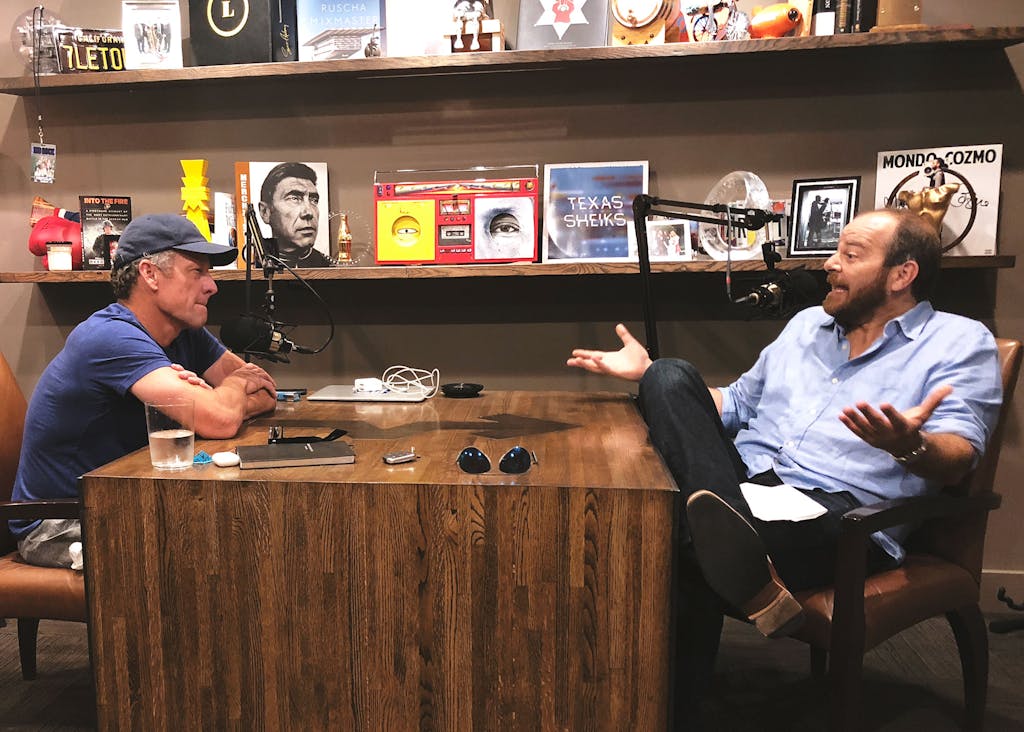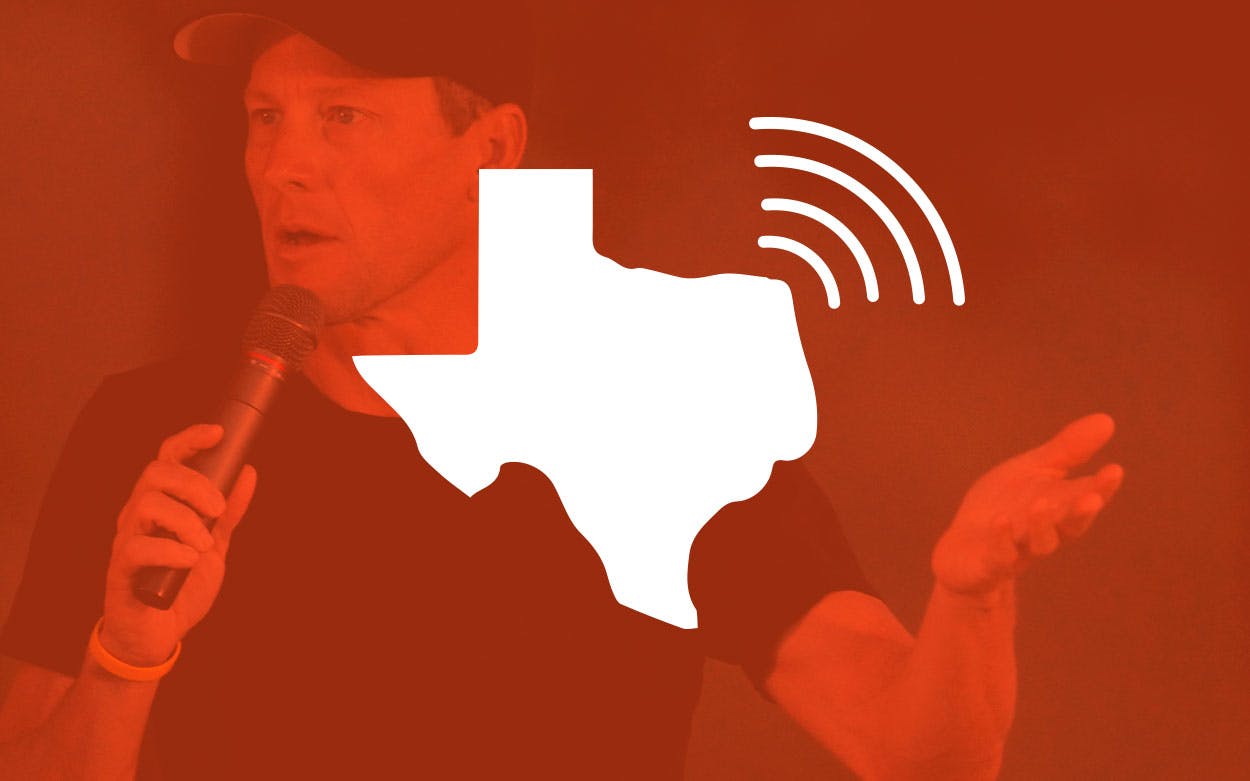Just a little more than five years after getting grilled by Oprah, Lance Armstrong is now the one asking the questions. From an East Austin studio built specifically for his weekly podcast, “The Forward,” Armstrong has interrogated an impressive array of newsmakers, athletes, and entertainers—from Luke Bryan to Wendy Davis, Lyle Lovett to Bo Jackson, Mia Khalifa to Dale Earnhardt, Jr. And this summer he’ll offer near-daily coverage (and criticism) of the Tour de France on his other podcasting platform, “Stages: A Cycling Show.” We’ve got a podcast, too, and invited Armstrong on for what’s become an increasingly rare interview, where he weighs in on the state of Texas cycling, what he’d do differently (spoiler: not much, but not nothing), and, in a nod to what’s happening in D.C., what it feels like when the feds are closing in on you.
Scroll down for highlights from their conversation.
Subscribe: Apple iTunes | Google Play | Stitcher
On cycling in Texas: I moved from Dallas to Austin 28 years ago to have better training. And I got it. I got it in spades. But as we all know, especially in Austin, things have changed. The riding is different here [now] and there are parts of the state that are still great. There are things that we could have done to make it better, to protect cyclists, and we could keep up with the infrastructure in terms of commuting within the cities, whether it’s Austin, Dallas, Houston, San Antonio, etc. We certainly didn’t do that. They’ve tried to put Band-Aids on them in Austin, because we’re trying to put Band-Aids on everything here in Austin. And Rick Perry vetoed the three-foot passing law, which was just a no-brainer. Give somebody some space. If a squirrel is in the road, trust me, they’re giving them three feet. A dog. A giraffe. I don’t care what it is. They’re getting three feet. So how about a human being? How about we give them even more? Most states have that. We don’t.
On the route of the Texas Hundred, a non-competitive 100-mile ride he’s organized for this weekend: This route is hands down the most beautiful hundred-mile route in Texas. I’d never ridden in that part of Central Texas or the Hill Country. It’s interesting … if somebody is going out there and has ridden in Fredericksburg, Kerrville, Leakey, Vanderpool or Utopia, the true heart of the hill country, where the hills are steep and longer, this isn’t like that. It’s rolling. It’s gentle. There’s no steep gradients on this course. There’s one steep downhill, but there’s no steep uphills, and of course we’re in wildflower season so it’s going to be absolutely gorgeous.
On what to expect at this year’s Tour de France: A lot of the dynamics of the tour depend on the route. If you had 21 days riding around Paris flat, it would be really boring. Nothing would happen. It’s [the tour organizers’] responsibility to pick a route that animates the race. The one that they’ve picked for 2018? When I saw it, I said, “Holy shit. What a gift for the fan.” And for me, because I’m now the person that has to sit here and talk about what’s happening. And if it’s a boring day, well then I’ll just tell you that it was a boring day. But I’d rather it be exciting. They picked a route that is super-hot, super-dynamic.

On his son, Luke Armstrong, who announced Wednesday that he’ll join the Rice University football team in the fall, after reaching the semifinals last season with Westlake: When Rice called, that was a real opportunity. As a parent, the education that as a student-athlete he can walk away with? We all, including his mom and stepmom, completely agree that the game is a brutal game, it’s a violent game, there is stuff that can happen to these kids. But you weigh those, and Rice is a great school, so we were excited for him. Somebody joked that maybe he’ll never play a down and graduate from Rice. But he’s an interesting kid. He never showed this in his younger years, when he played sports as a kid he wasn’t a killer, but in high school and particularly his junior year, something went off in his head and he became very serious and trained a lot harder. He was a lot more aggressive on the field, in a good way. And so I suspect he’s got another level, another switch coming, in college. But I’m super proud of him. He’s great dude.
On the past five years: I’m at peace with who I am. It’s been a wild ride, and I’m sure there’ll be plenty of other wild things that happen in the future. Forty-six years, and especially the last five, I wouldn’t change anything. [After Oprah] I got questions like, ‘What would you change?’ or ‘What’s your biggest regret?’ Back then I said my biggest regret was coming back [to the 2010 Tour de France]. Because when I came back, that put me back into the global scene that put me in the crosshairs. And they got me. I don’t look at it that way anymore. But that is what happened. Let’s not be mistaken. If I don’t come back, you and I aren’t sitting here talking about this and nothing changes. That’s a fact. But if I don’t come back, then I don’t go through all this, I don’t learn a lot about myself, and I don’t learn exactly who my friends are and aren’t. I don’t learn where my place fits truly and authentically in society. And that’s a really powerful place to be, and very few people know that. It has completely sucked on certain days and times and periods. It’s been incredibly stressful financially and emotionally, as you can imagine. But look, I’m a survivor, and my family are all survivors. And we will all survive and we’ll all be fine. And they’re doing great. And so that’s the important thing.
On the one hand, I can say I wouldn’t change anything. And people hate this because it’s like, “Oh my god, you mean if you had the chance to go back to Italy in 1995 when you decided to cross that line, you wouldn’t change it?” I mean, most people who are listening or reading or watching, they’re “perfect,” so they think it’s bullshit. But then again, this is where it gets a little complex. I would change the way I treated people. Whether it’s journalists, whether it’s former teammates, whether it’s former teammates’ families or former staff. I would completely change the way that I treated them. And that’s the part, as I’ve walked this road for five or six years. I’ve heard from thousands or hundreds of thousands of people. The first part they’re more or less fine with. The second part? Nobody is cool with that. That’s what should have changed, but I didn’t have it in me.
On what it feels like to be the subject of a federal investigation: I’m really shocked by Donald Trump. The things he says about Bob Mueller? Dude, come on. That’s the one guy—I mean, I guess he could theoretically fire him, but that’s the one guy who’s going to decide how miserable to make your life. We always tried to say very little if anything. And we certainly didn’t go after the U.S. attorney’s office in Los Angeles. We didn’t go after the investigators. I mean more or less, we stayed out of it. Once they start showing up with badges and guns to your friends’ house, to your family’s house, to your teammates’ [houses]? I mean, there isn’t anything you can do. I don’t care how friendly you are with somebody or how much you love them and they love you or how loyal they are. They know what they’re doing, and I’m not trying to criticize them for how they do it. Sometimes their tactics are not very honest and genuine, but that’s the way they go about it. But even then, I knew what happened. I also knew that I had this wave of momentum and goodness. Cycling was doing great and Livestrong was doing great. And my family was doing well. Selfishly, I didn’t want to crash that wave. But when it’s all coming down on you, it’s terrible. And it’s expensive. Very expensive. And people pull back. Again, I’m not being critical of federal investigators or U.S. attorneys but there’s probably a fair amount of, “Look, we’d rather you not tell him what we talked about.” And, of course, the law says that they can walk out of that room and buy a billboard or go on Howard Stern. Or call me. They can do that, but nobody does, because all of a sudden everybody just starts getting away from it. And it’s because they’re scared and because they want to protect themselves. It took me a long time to understand that somebody else would actually want to protect themselves and their family. But now I get it. I mean, I got ratted out by my closest friends, my closest teammates. I spent three years going, “fuck these motherfuckers and fuck em’ forever.” And now, I lived with it and I realize that I have a family. If I was in that position, I would do the very same thing to protect my family. And so I forgive them. I understand. I get it.
On what he expects to be the highlight of the Texas Hundred: There was a young kid about a year ago up in Georgetown—Tommy Ketterhagen, He was a young promising cyclist who was out on an evening training ride when a couple kids roughly his age hit him head-on and killed him. But Tommy Ketterhagen’s entire family—something like six siblings, Mom and Dad—they’re manning the seventh aid station at the [Texas Hundred] race. So I’ll be riding, thinking about how I can’t wait to get to number seven to get off my bike to hug this family and say thank you. If you’re a family that doesn’t ever want to go to a bike event ever again, I would understand that. It makes total sense. But they’re amazing humans, so I’m looking forward to hanging out with them. By the way, in the old days I never stopped at aid stations. I don’t care how big the Livestrong ride was, how much money they made, all the stories about these amazing volunteers. I’m like, “No way. I’m getting done as soon as I can.” But I stop now. I’m old and slow. I’m an old man now.






